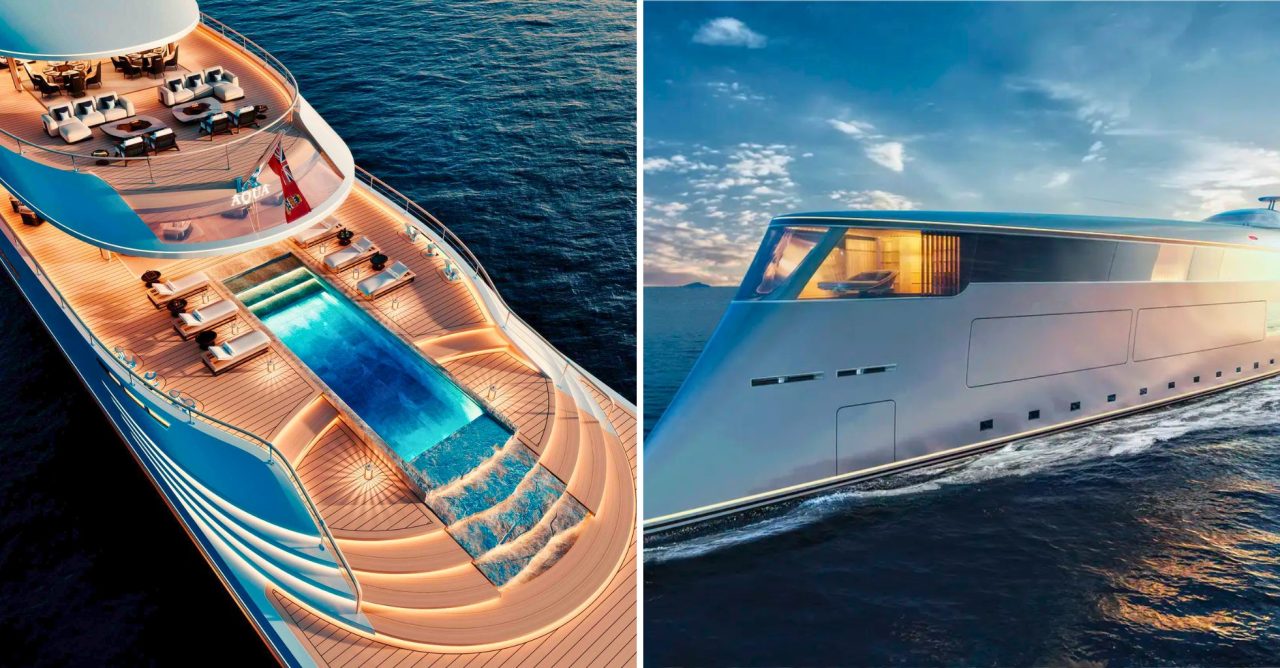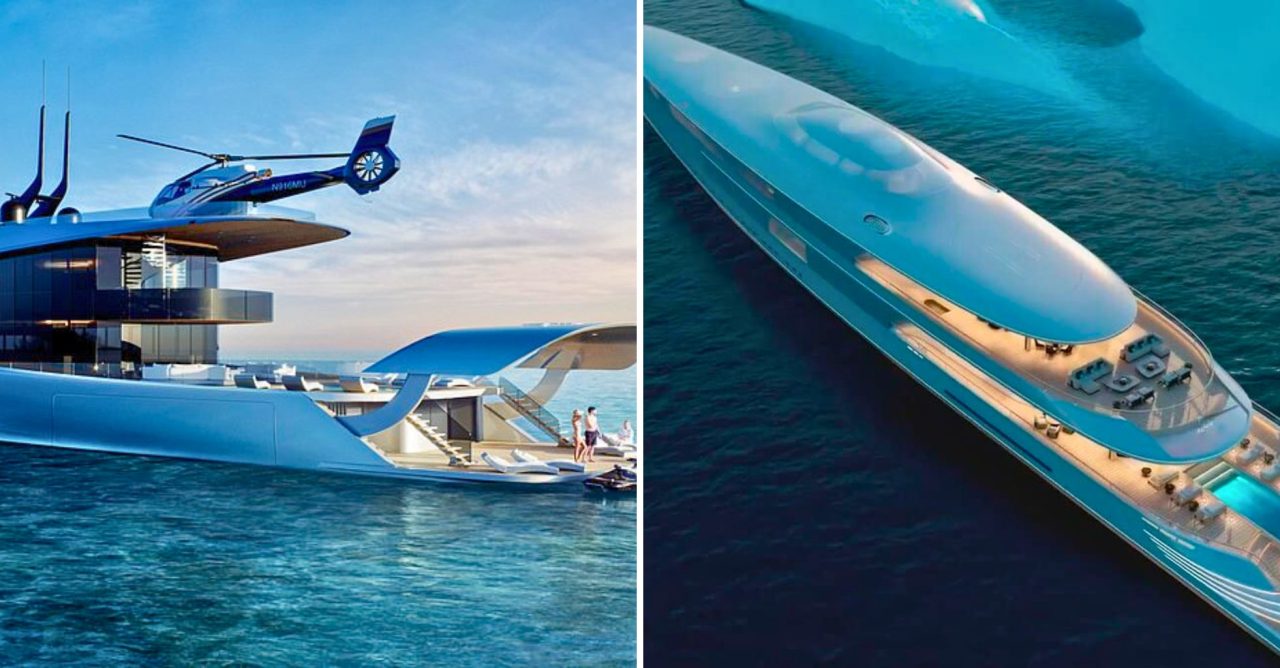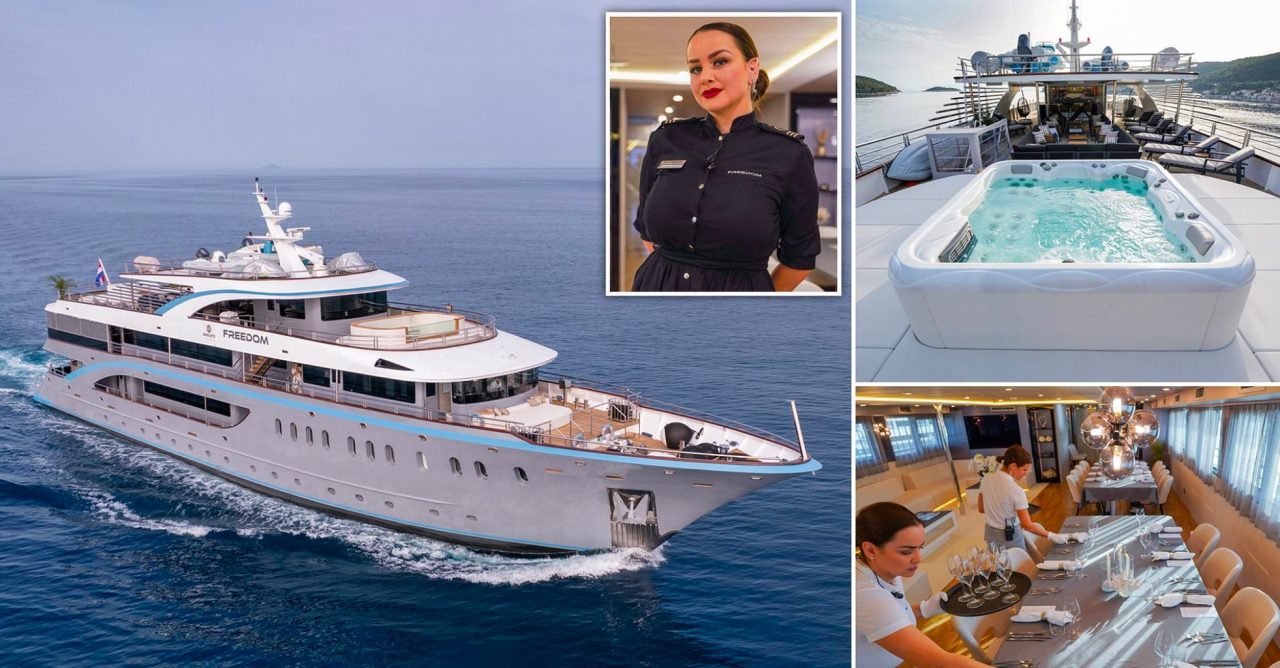Of late, it seems that a metre is no longer a metre. Boats are getting bigger within the same envelope, but usually at the expense of fluid lines. Not the new Mangusta 165 REV, which has grown without losing its graceful appearance, says Cecile Gauert.
“I drew inspiration from the luxury sports cars of the 1920s and 1930s,” says designer Igor Lobanov of the exterior of the new Mangusta 165 REV, a reinvention of the yard’s successful 165 model. Look for the line that drops beneath the top window right after the long foredeck: it mirrors the line in an old-fashioned car with a long bonnet. “People used to sit down low behind huge engines and the line used to drop immediately after. That is how this idea came to me,” Lobanov says. “But the reason we needed to do that was that the shipyard required [us] to place the owner’s suite on the main deck. A key difference between the two Mangustas (the 165 REV and the original 165) is here, in the front end, we have two decks instead of one, and you can’t tell the height difference.”
That’s true. The award-winning Mangusta 165 REV – which took home the prize for Outstanding Exterior Design at the 2023 BOAT International Design & Innovation Awards – appears the same as its predecessor but is in fact a radical reinvention.

Breaking free of a formula that has worked well in a business environment is never easy. It is also quite expensive – requiring development, engineering and new moulds. Mangusta sold 12 of the 165s designed by the late Stefano Righini as the brand’s flagship, in about as many years. Tweaks followed the first few deliveries, customisations that the shipyard adopted down the line – a lower bulwark here, bigger windows there – but fundamentally the design remained the same. The changes represented an evolution rather than a revolution.
But with the change in tastes and boating habits, the time had come for a more definite renewal in Mangusta’s successful Maxi Open line. The first of the Revolution projects in Mangusta’s line of fast boats was the Mangusta 104 REV. The Italian shipyard worked with Lobanov Design on the new model, which received great reviews when it appeared at the Cannes Yachting Festival in 2021. Simultaneously they worked on the flagship, but that revelation would take another year. The Mangusta 165 REV debuted a year later, at the 2022 Monaco Yacht Show.
The relationship between the Barcelona-based designer and the Italian shipyard has been a good one. It was Mangusta that approached Lobanov. “We contacted Igor Lobanov because we were really impressed by the projects that he designed between 80 and 110 metres. We were not sure he was interested in designing smaller yachts; we were pleasantly surprised about his decision to collaborate with Mangusta,” says Overmarine group CEO Maurizio Balducci. “Furthermore, Lobanov really liked the Mangusta yachts, and he was really enthusiastic to work with us on the design of these new projects.”
Mangusta does nothing in a hurry. The family-owned shipyard is thoughtful and deliberate. The gestation was long, even before the development work started with Lobanov in 2018.

“We did work for years on several projects and only when we were satisfied with the new 165, we decided to start the production of a new line,” Balducci says. “The difficult part was to find something to better the previous model. We focused on the increase of efficiency, consumption reduction and optimisation of the onboard space. We paid special attention to the owner’s suite, which we moved to the main deck, creating a unique space for this category of yacht and keeping the sport line of the yacht.”
If at first glance, the Mangusta 165 REV doesn’t appear that different from the original, think again. This yacht feels so much larger – while remaining below the 500 gross tonne threshold at which additional regulations would apply, naturally.

It is a mind-bender as well. It is nearly impossible to decipher what the inside is like from the outer profile. The best way to appreciate the vast differences between the inspiration and the current iteration is to look at the yacht at night, when lights inside make the sheer quantity of glass obvious, Lobanov says.
A superyacht designer who preceded studies in car design in Turin with a degree in mathematics, Lobanov got to assess the reaction of people discovering his design in Monaco. He helped take a steady flow of clients, brokers, judges and media through the first Mangusta 165 REV, named N1, at the show.
“I had a lot of fun. I enjoyed seeing people with their jaws dropping every time they entered the master bedroom,” he says, reminiscing about the action-packed few days in Monaco.

I was one of those people. I couldn’t help but let out an involuntary “wow” as I set foot in the owner’s suite – so much for my game face.
It was apparent from the get-go that things were different on this new 165. Upon entering the main saloon, even with boats on both sides, the effect of the large windows and high ceiling is extraordinary. The ceiling at the centre is already more than two metres, but it appears to be more than three metres on the sides, because where there would normally be solid fibreglass above the windows’ top frame, there is more glass.

Impressed already but a bit disoriented, I follow my guide from the main saloon, down a slight slope to the fore end of the deck and pass unknowingly under the wheelhouse. Here I find myself at the threshold of a huge, mostly carpeted space, with windows so much bigger than they appear from the outside, where in the grand scheme of the whole yacht, they seem modest additions. With painted surfaces judiciously added, from the outside these forward windows visually register as a line, not unlike the Nike Swoosh, above which are a few more windows in the grey register. On a side profile photo, look for the rectangle near the triangles toward the front of the boat – that window is about one metre high. It’s hard to fathom.
At the threshold of the owner’s suite is a seating area then an arch and curving steps down to the bedroom proper, which has a round bed located off centre that was custom built for the owners.

Placing the owner’s suite forward on the main deck is not that new, especially for a yacht that is 50 metres in length – it’s more the norm than not these days. But the builder and designer did not just move the bedroom up, they reinvented the space without losing sight of the original Mangusta 165’s traditionally flowing appearance. This feat results from a productive and close collaboration between the designer and the yard’s in-house engineering department.
“The Lobanov design is amazing and innovative. What was really striking is the way he conceived and developed the windows of the owner’s cabin in the Mangusta 165 REV. A huge window perfectly integrated into the hull,” Balducci says. For his part, Lobanov says he very much enjoyed working with the engineering team who helped translate his vision into a stunning reality.

Inside, the owner’s suite is grand – it is 92 square metres, so quite large, but it seems even more so. “I realised how important it was to give this (space) three or four steps to change the height. We have not increased the gross tonnage, we shifted it,” Lobanov says.
To make this happen, the builder had to raise the forward section of the deck, above which is a spacious outdoor lounging area. The difference in elevation on the forward main deck is hard to grasp at first glance. Overall, the new Mangusta is about 60 centimetres taller than the previous one, something a captain would want to know when clearing a low bridge but very hard to notice when the yacht is in its marina slip.
The owners of the first hull worked with the shipyard’s in-house team on the interior material selection, a mix of nubuck, lacquered panels, smoked mirrors and plush carpet. The colours in the beige scale, the curves and the light patterns give a retro-modern vibe, a bit Star Trek: The Next Generation. I like the look, but with this kind of space anything is possible. It could be completely different and more luxurious still.
Fundamentally, the designer and builder reinvented the yacht’s layout, and from the black line of windows on the lower deck up, the Mangusta 165 REV is a brand-new yacht.
Closer to the original are the hull and the engine space, with quad MTU engines coupled to four waterjets giving a yard-specified top speed of 34 knots, although in sea trials the first hull exceeded that. Even here, however, the shipyard has tweaked the hull lines and improved the tech over the years, and fuel efficiency has increased significantly. The construction material has also changed slightly with the addition of a bit more carbon fibre.
“Structurally the boat has been completely redesigned, using FEM analysis,” Balducci says. “We paid a lot of attention to weight reduction, which is one of the major elements that contributes to reducing (fuel) consumption. Thanks to the hull and weight optimisation and the propulsion package improvement, the fuel consumption has been reduced about 30 per cent at a speed of 30 knots, compared to the first generation of Mangusta 165. At 11 knots the (semi-displacement) Mangusta 165 REV burns (the same amount) as a displacement ship, and thanks to the stabilisers you can cruise at this speed with maximum comfort.”
The space distribution down below is also new, starting from the significant addition of a beach club. In the previous hulls, the crew area and a compact galley were at the back.

“We said, ‘this is wrong, this is an outdated configuration’,” Lobanov says. “It forces the crew to pop up in the saloon.” He suggested moving the crew area forward where they enjoy more independence and can circulate without having to cross the main guest areas. It is now below the vast owner’s cabin and has a larger galley than in previous boats.
The addition of a beach club mandated finding a different solution for the tender garage as well. It is now positioned in front of the engine room space, with a side door opening. It’s a handy extra buffer separating a full-beam VIP suite from the engine room.

Each yacht is customised: on N1, the owners chose to use some of the beach club space to create a hammam, dayhead and storage for toys, but the beach area could remain an open space. In combination with a large bathing platform, it is a substantial open-air recreation area.
Despite these additions and the larger galley, the yacht has five generous guest cabins below, four of them with equal amounts of space, plus the VIP, all with private en suites, naturally.
Above deck, the spaces are just as impressive. Mangustas were born to the Mediterranean lifestyle, so it is in their nature to offer ample outdoor spaces. The new 165 REV has more than ever. Two drop-down balconies off the main saloon are 18 square metres each. The sundeck is a generous 69 square metres. The aft deck is another major space for entertainment, at 71 square metres. And then, of course, there is that substantial forward lounge. The side decks are also comfortable to navigate.
“All the guests who visited the Mangusta 165 REV at the Monaco Yacht Show were really impressed by these kind of features, never seen before on this kind of yacht,” Balducci says. The design makes it feel as if a metre is now more than a metre. It does seem a little magic was at work in the creation of the Mangusta 165 REV.
Credit: Alessandro Guerrieri
Source: boatinternational













